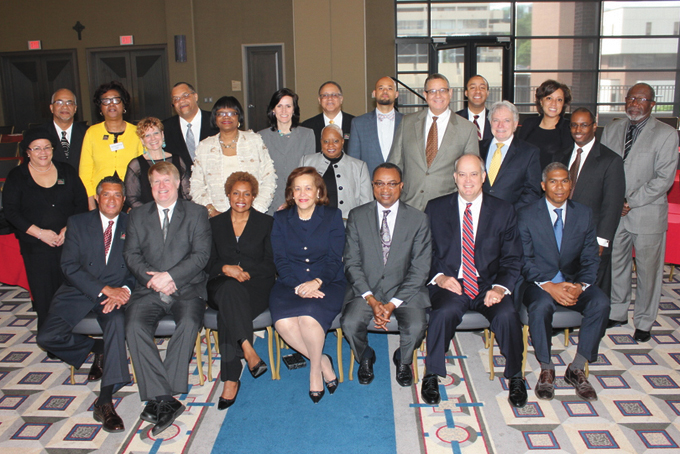
CORPORATE EQUITY & INCLUSION ROUNDTABLE—Twenty-five organizations convened to make the event possible. (Photo by J.L. Martello)
On May 13, leaders from some of Pittsburgh’s largest corporate entities were asked to consider the implementation of the Rooney Rule in their hiring at a historic meeting of corporate, government, and community leaders.
Leading the call was Robert DeMichei, senior vice president and chief financial officer of UPMC, who said it is already committed to implementing an adapted version of the Rooney Rule.
“I think you saw a lot of commitment across the spectrum,” said Allegheny County Executive Rich Fitzgerald, who played a key role in bringing the meeting to fruition. “I think UPMC did a great job of issuing a call to action.”
The Corporate Equity and Inclusion Roundtable was the product of 25 convening organization led by Fitzgerald and Black Political Empowerment Project Chairman Tim Stevens who solicited Fitzgerald’s support for the initiative in 2011.
According to Stevens, UPMC committed to expanding the Rooney Rule to all levels of hiring and also contracting while calling on others to do the same. Stevens said UPMC has also suggested corporations commit to producing annual reports on their hiring and contracting.
The Rooney Rule, created by Pittsburgh Steelers owner Dan Rooney, requires National Football League teams to interview minority candidates for head coaching and senior football operation job openings. Current Steelers President Arthur Rooney II presented the Rooney Rule’s possible application in corporate Pittsburgh at the event.
“There were very powerful statements today,” Stevens said. “Part of it was a collective admission that we’re not where we need to be.”
According to census data, in 2011 African-American unemployment in the Pittsburgh region was at 19 percent. In 2010, the region was listed as 40th out of 40 regions in the nation with regard to the conditions of the Black working poor.
“Changes in culture take a long time. But most of the time conversations like this are pretty negative. Pittsburgh has had a lot of unsuccessful initiatives, but today there were a lot of success stories,” said Paul Harper, a professor at the University of Pittsburgh Katz Graduate School of Business. “No one is debating there is a problem.”
While the event’s coordinators said leaders from several private entities were committed to increasing diversity and inclusion, the media was prohibited from attending the roundtable to hear commitments from corporations first hand. Still, other community leaders said they believed the meeting would have an impact on helping minorities.
“I think getting the diverse mix of corporate, government and community, the number of people who were in this room, is exactly the appropriate platform for us to move forward,” said Esther Bush, president and CEO of the Urban League of Greater Pittsburgh. “It depends on the follow up but I think all of us have committed to the follow up.”
“It’s a call to action but hopefully this time around it’ll be more than talk,” said Robert Agbede, president and CEO of Chester Engineers.
Stevens said corporate leaders will have the chance to share their commitments with the public at a press conference some time next week.
Your comments are welcome.
Follow @NewPghCourier on Twitter https://twitter.com/NewPghCourier
Like us at https://www.facebook.com/pages/New-Pittsburgh-Courier/143866755628836?ref=hl